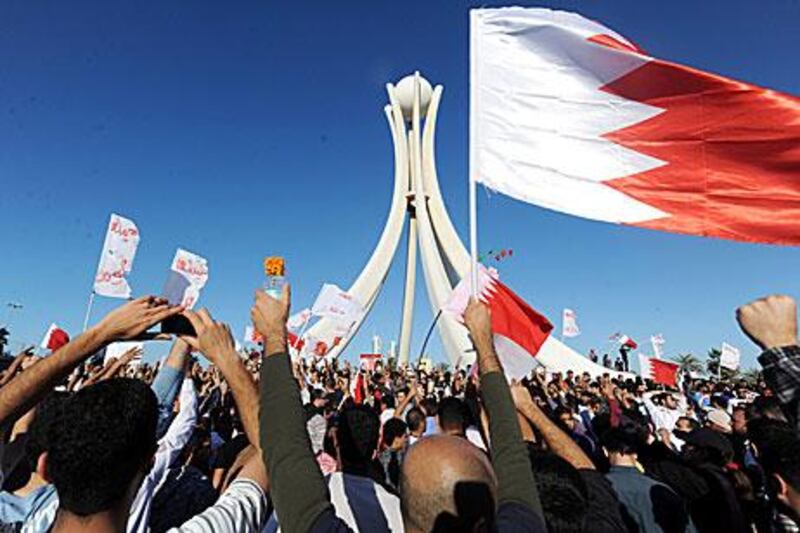Just 12 months ago, a tall, white monument to Bahrain’s pearling dominated one of the capital’s main traffic roundabouts.
As 2011 ends, Pearl Roundabout no longer exists.
It was demolished in March, after it became the focal point and the symbol of the pro-democracy protests.
Now in its place is the Al Farooq Junction, its entrances still blocked off and guarded by security forces.
It would be easy to view this altered landscape as a metaphor for Bahrain’s turbulent past year. It would also be facile.
Through 2011, the island kingdom was rocked by popular protests – inspired by similar upheaval elsewhere in the Arab world.
The demonstrations that started in Manama in mid-February were followed by a swift and violent crackdown by Bahraini security forces bolstered by a GCC force including Saudi troops and Emirati police.
After a period of martial law, the government made some conciliatory moves to address the grievances of the predominantly Shiite opposition, with an investigation into abuses by security forces and promises to push ahead with long-awaited political reforms.
Yet, as this tumultuous year draws to a close, Bahrain’s political terrain remains substantially unchanged, auguring an uncertain and uneasy 2012.
The Pearl Roundabout story is far from over.
Opposition supporters have not given up on their demands, which include a constitutional monarchy and an end to what many describe as institutionalised discrimination against the majority Shiite population.
Bahrain has a long history of political activism. But what began 11 months ago was something unprecedented in scale and fervour.
The government responded in kind, moving quickly to quash the uprising – 35 people were killed in the first two months of the crisis alone.
Opposition leaders were jailed and many more ordinary citizens involved in the protests were detained.
Thousands were dismissed from their jobs, students expelled from universities and medics arrested, eventually joining those who were brought before a special military court.
Amid international criticism of the government’s actions and allegations of serious human rights abuses, an atmosphere of deep distrust and fear set in.
Many Sunnis were angry, and still are, about what some believed was an Iranian-backed plot to overthrow the government.
Emboldened, some groups emerged as a counter to the largely Shiite opposition.
Others, a smaller group occupying what they described as the middle ground, pleaded with both sides to back down.
But, the protests have not stopped, the pressure on the government has not eased and divisions have not healed.
In some parts of the country, demonstrations are a daily reality.
In one recent incident, a funeral procession attended by thousands of mourners turned violent when police and a small group of protesters clashed.
After tear gas was fired into the crowd, people fled into nearby homes. Inside the living room of one cramped apartment, a man in his forties who would only give his first name, Aqeel, sighed in resignation.
“This has become our daily life, like our daily routine,” he said.
Still, in some parts of the country, the only visible signs of trouble are checkpoints at entrances to largely Sunni neighbourhoods or flashpoints close to Shiite villages.
Society’s divisions are mirrored in the government itself.
Moderates have made several attempts to kick-start a process towards reconciliation.
King Hamad bin Isa Al Khalifa even took the bold step of inviting international human rights experts to the country.
After months of investigations, the Bahrain Independent Commission of Inquiry (BICI) delivered its harsh assessment at the end of November.
It found abuse of detainees, including torture, and excessive use of force were systemic. But it also found mistakes had been made by both sides.
Some of the findings echoed a report by the government that came out two days earlier.
The government will set up a national human rights institution, punish officers who broke the law and pledged to implement the commission’s recommendations.
The king welcomed the BICI report as “of profound value to us” and vowed reforms.
Members of the opposition appeared vindicated by many of the conclusions by the commission, but stressed fixing those issues would not fix the fundamental political problems at the heart of the crisis.
Now, as the protests continue into a new year, there are concerns that the changes on the ground have been too little.
“[There] is a serious risk that this opportunity could be lost if there is no visible progress in the short term, especially with the continuing clashes between protesters and police,” said Jane Kinninmont, a senior research fellow at Chatham House, a UK-based think tank.
“I hope the government does seize the opportunity to carry out real, meaningful reforms before the anniversary of the protests [February 14], or I think we will see further escalation then.”
zconstantine@thenational.ae





